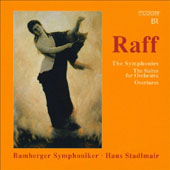
ESSENTIAL RECORDINGS

Raff Rebounding: Joseph Joachim Raff (1822-1882) was Swiss by birth and German by musical temperament. As a
young man he received the patronage of Felix Mendelssohn and Franz Liszt. Raff was Liszt's secretary from 1850 to 1856 and he assisted the established composer in
orchestrating orchestral poems and figured in the "New German School" of music. As a composer, Raff was able to bridge the gulf between musical conservatives and
the New Germans in eleven programmatic symphonies and other orchestral works. By 1975, commentator Ebenezer Prout wrote, "Among living German composers there
are three, who, by common consent, are admitted to stand in the front rank…Wagner, Brahms and Raff." While Bruckner and Mahler had to struggle to gain acceptance for
their works, Raff enjoyed wide popularity during his lifetime and oblivion after. He earned the admiration of Hans von Bulow and P.I. Tchaikovsky and in the 20th century,
Bernard Herrmann claimed that, "The Leonore Symphony is one of the finest examples of the Romantic Programme School – it deserves a place alongside the Symphonie
fantastique of Berlioz, the Faust Symphony of Liszt and the Manfred Symphony of Tchaikovsky." While the composer has not been entirely ignored in recordings, Tudor
of Zurich has handsomely filled in many gaps in the discography of their native son with this boxed set of nine CDs. These works are important links between the last of
Robert Schumann and the First of Johannes Brahms.
Contents of the jolly yellow box: The disc listing is informative:
- (1) Symphony No 1 "AN DAS VATERKLAND" (1859-61) 67:47
- (2) Symphony No 2 (1866) 36:53; Suite: "AUS THURINGEN" 35:47
- (3) Symphony No 3 "IM WALDE" (1869) 45:00; ITALIAN Suite 31:40
- (4) Symphony No 4 (1871) 31:42; Overtures: BENEDETTO MARCELLO, DAME KOBOLD, DIE PAROLE, and Concert Overture
- (5) Symphony No 5 "LEONORE" (1873) 49:58; Suite No 1 for Orchestra 29:37
- (6) Symphony No 6 (1873) 33:12; Suite No 2 for Orchestra "IN UNGARISCHER WEISS" 35:50
- (7) Symphony No 7 "IN DEN ALPEN" (1875) 42:25; Chaconne BMW 1004 (JS Bach) Arrangement for Orchestra; ABENDS Rhapsody
- (8) Symphony No 8 "FRUHLINGSKLANGE" (1876) 38:18; Symphony No 10 "ZUR HERSTZEIT" (1879) 30:45
- (9) Symphony No 9 "IN SOMMER" (1878) 38:32 Symphony No 11 "DER WINTER" (1876/77) 35:03
The original cover art (details from paintings by Arnold Böcklin) was retained for each disc sleeve.
An die musik? Snotty critics, who resort to the old standby about 'the whole being unequal to the sum of the parts,' haven't been listening with objective care. The parts
are indeed glorious but Raff succeeded in the demanding task of integrating contrast into large-scale works. And he did that cohesively eleven times. His failure as an
opera composer redoubled his dedication to the symphony and with excellent recordings at hand, we are the beneficiaries. His First (To the Fatherland) was awarded
the prize of the Gesellschaft der Musikfreunde in Vienna and found audiences beyond the German speaking lands. Nature is a common theme in these symphonies. It is
nature perceived rather that re-animated in the manner of Mahler, but nature just the same. The Fifth (Leonore) was inspired by Gottfried August Bürger's 18th century
ballad ("Forbear! Forbear! Though hearts should break/Blaspheme not, lest God's wrath thou wake"). It is a work of spectral drama and vivid tone painting. It is
impossible to disagree with the opinion of Bernard Herrmann cited above. With No 7, Raff takes us into the mountains and the last four symphonies are an orchestral
four seasons. Several of the rewarding bonus items are of impressive symphony-length and complexity. No adherent of the Romantic period in music should be without
this set. The Bambergers under veteran conductor Hans Stadlmair give us splendid, loving renditions which will be recognized as definitive. The recording sessions were
between 1999 and 2005 and audio quality is of the highest standard.
Stephen Habington